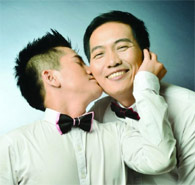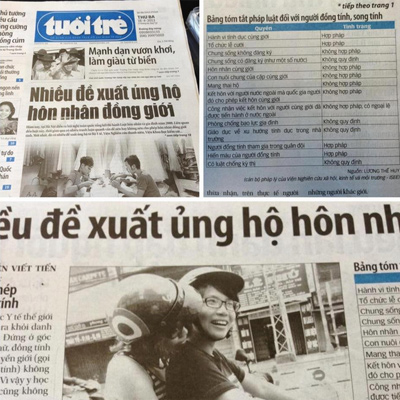THAILAND
In the fall of 2012, the issue of legal recognition for same-sex relationships was taken up by the Committee on Legal Affairs, Justice and Human Rights of the House of Representatives, the lower house in the Thai Parliament.

Backing this initiative was the National Human rights Commission of Thailand and the Rights and Liberties Protection Department within the Ministry of Justice.
Three ‘civil society’ representatives were named to advise the Committee. They have participated in committee debates, public hearings and the drafting process, without a vote. The best known of the three is Anjana Suvarnananda, or Tang, one of the founders of the pioneering lesbian organisation Anjaree.
This legislative drafting process has the approval of the two major parties in Thailand, but without any commitment to ensure eventual passage of reform legislation. Some figures within the two parties have reservations about such a reform.
In the first half of 2013 the Committee held four ‘seminars,’ or public hearings, in different parts of the country. The Committee decided to propose separate legislation, establishing a system of ‘civil unions’, without any change to the existing law on ‘marriage.’
The Vice Chair of the Committee, Wiratana Kalayasiri (Wirat), is a lawyer, representing a constituency in the south of Thailand, and a member of the opposition Democrat Party. He is responsible for the drafting process. He has insisted that the rights involved in civil unions will be identical to those for marriage.
No provisions on custody or adoption of children are in the current draft. Wirat has said that in Thai law, adoption is handled separately from marriage, and he has wanted to avoid subjects that may prove controversial (as adoption rights have been in parts of the West).
The current draft has a higher age of consent for civil unions than for marriage, using the voting age of 20. One of the partners must be Thai, barring foreign couples from using the process. Marriage to a Thai does not lead to citizenship for a foreign partner, and this would be true for civil unions as well.
Wirat proposes that NGOs collect 10,000 signatures to allow the draft bill to be debated in parliament, along with a civil society committee of eleven individuals (a special procedure provided for in the Thai constitution).
There are two other ways in which a draft bill could get before parliament, either as a government sponsored bill, or with the support of 20 members of the House of Representatives. These two other processes seem not available, at least at the present.
There has been limited publicity about the issues and the process in Thailand. Thai LGBTI NGOs express support for the draft bill, but with concerns and reservations. No coordinated civil society push for the reform is visible. The earliest a draft bill might get to the Parliament would be October.
VIETNAM
In 2012, the Government of Vietnam began the process of drafting new provisions in the law on marriage and the family. The government identified eight separate issues that needed to be addressed, including heterosexual cohabitation and same-sex cohabitation. A legal prohibition of heterosexual cohabitation had been ended in 2000.
Specifically on same-sex couples, the Minister of Justice stressed that the legal system had no rules to handle disputes over property or custody of children when cohabiting couples separated. What startled observers was the Justice Ministry saying, in writing, that the recognition of same-sex marriage was inevitable according to human rights principles.
Support came from the Ministry of Health. The Deputy Minister said “gay people have the same rights as everyone else to love, be loved and marry.” Public consultations followed.
In 1998 the National Assembly had passed a law banning same-sex marriage, and imposing fines of individuals holding marriage events. In 2013, the government announced that fines would no longer be imposed.
Two well organised NGOs, iSEE in Hanoi, and ICS in Ho Chi Minh City worked hard to support the government proposals. Both are officially registered Vietnamese organisations, with foreign funding and paid staff. No Thai NGOs compare in terms of organisation and activity on the issue.

The Tuoi Tre newspaper quoted the health ministry as saying that
homosexuals, like everyone else, have the right to live, to dress,
to love and to be loved, and to pursue happiness. Photo courtesy of
ICS (Information Connecting and Sharing) Facebook page
In December, 2012, the Ministry of Justice, supported by the UN Development Program, brought two academics, from the Netherlands and the US respectively, to discuss issues of relationship recognition and marriage in the West.
Unlike in Thailand, this process has been government initiated from the start. Sponsorship by the Ministry of Justice and the Ministry of Health, however, do not guarantee passage in the National Assembly. The Women’s Union, a mass organisation, has expressed opposition to the recognition of same-sex relationships, but it is not clear whether that is because of the references to ‘marriage’ in earlier stages of the process.
In July, 2013, the government’s exact proposal became clear. The Civil Code would be amended to grant legal recognition to heterosexual cohabitation on matters relating to property and children. Couples could enter into a contractual agreement on rights, but the courts could ignore those provisions if they were deemed unfair.
In the absence of reasonable contractual provisions, the rules applicable to married couples on property and children would apply to cohabiting heterosexual couples. An additional, short section makes the same rules apply to same-sex cohabiting couples. There are no provisions for ‘registration’, unlike the Thai ‘civil unions’ proposal.
The Government proposal is expected to be considered by the National Assembly in October.
Douglas Sanders is a retired Canadian law professor, living in Thailand. He can be contacted at sanders_gwb@yahoo.ca.











 打印版本
打印版本
















读者回应
The law of allowing couples to make a contractual agreement to live as a legal couple should be equal for straight couples as well as non-straight couples.
In using two different names to define a couple legally joining, the government is blatantly demonstrating there is still discrimination against non-straight couples. This is only going to lead to more discrimination and conflict. Many countries are allowing marriage for all; why can't it be universal instead of making the situation worse? Marriage is Marriage.
请先登入再使用此功能。